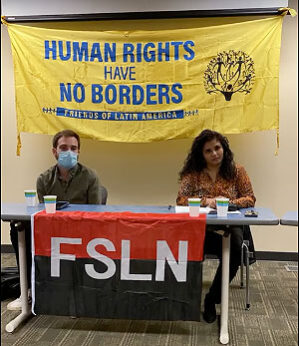
WASHINGTON—Challenging the narrative parroted by U.S. corporate media about Nicaragua’s November elections was the focus of an event here on Sunday, Dec. 12 Solidarity activists and friends from the D.C. metropolitan area gathered for a session co-hosted by the Friends of Latin America and the Claudia Jones School for Political Education. Youth observers who participated in delegations with the Friends of ATC, Black Alliance for Peace, Friends of Latin America, and as independent media were the featured speakers.
Nicaragua, a small country in Central America bordered by Honduras to the north and Costa Rica to the South, has been a victim of U.S. aggression since the return of the left-wing Sandinista Party (FSLN) to power in 2007. The Sandinistas, who first came to power in 1979 after overthrowing the U.S.-backed Somoza dictatorship, have been leading a struggle for major social change the last 14 years, a fight which has included winning universal healthcare, free higher education, and land reform.
The country recently held elections on Nov. 7, 2021. Prior to the vote even being held, U.S. media giants like the New York Times and the Washington Post, along with the U.S. State Department, were calling the elections fraudulent and undemocratic after their favored “candidates” were disqualified from running due to obtaining foreign funding.
The D.C. event opened with remarks from Leslie Salgado, a long-time activist and co-founder of Friends of Latin America, who discussed the myth that the U.S. promotes democracy in Latin American countries. She slammed the U.S. for funding young people on social media and by other means who spread these lies.
“We want governments that protect and defend the interests of the people, and the U.S. government is against that.” Salgado said.
She was followed by Debra Johnson, a local cultural worker and co-founder of the Claudia Jones School, and then by the Nicaragua Ambassador to the U.S., Francisco Campbell, who said, “The struggle we are waging in Nicaragua is very similar to the struggle [the youth] are waging here in the United States.”

Chris Guevara, who was part of the Friends of ATC delegation––which played a central role in the original Sandinista Revolution in redistributing the land formerly controlled by the dictatorship to 120,000 peasant families, organized workers into unions, participated in the literacy program for rural areas, and more––spoke on the neoliberalization of Nicaragua when the FSLN party was removed from power from 1990-2007.
Guevara noted that the FSLN party was voted out at the beginning of the ’90s thanks largely to the policies of the U.S. administration of President George H. W. Bush, who strong-armed Nicaragua and kept the country under threat of a continuation of the Contra war. The U.S. had been found guilty of damages in international courts at the time and was ordered to pay Nicaragua $17 million USD in reparations for orchestrating the deadly conflict.
This verdict was pardoned under U.S.-backed President Violeta Chamorro, who believed the U.S. would provide more aid than what was owed. During her time in office and under leaders who followed, the extensive network of cooperatives that were built up during the Sandinista Revolution were destroyed due to privatization, railways not being developed or maintained, and farmworkers suffered from free-market policies. But
Mass protests rocked the country in 2006 against electricity shortages due to privatization of utility companies. In 1990, 50% of the Nicaraguan population had access to electricity; by 2006 the number had only risen to 55%. Today, after 14 years of FSLN government, some 95% have access to power.
The rest of the conversation and discussion at the D.C. event centered around food sovereignty, autonomy for Afro-descendants and the Indigenous populations, the importance of global solidarity among African peoples, comparing the election process in Nicaragua to Honduras, and the lies that U.S. corporate media says about Nicaragua and the importance of building solidarity movements in the United States. Full coverage can be found on the Friends of Latin America Facebook page here and on the Claudia Jones School for Political Education Instagram page here.
Arturo Griffiths, a co-founder of the Claudia Jones School and leader of the Communist Party USA, closed out the event talking about the solidarity movements for Nicaragua in the 1980s in Washington, D.C. When the Sandinista Revolution won, Griffiths and others broke down the door to the embassy in D.C. that was still controlled by the Somoza dictatorship and took over the space. Activists also escorted a local Nicaraguan worker to the Organization of American States (OAS) to take the seat for Nicaragua.
Griffiths also noted that the Claudia Jones School was technically founded in Nicaragua, since its inaugural event in 2020 was held at the Embassy of Nicaragua. Griffiths said, “We need influence to shake the god damn country up! […] Claudia Jones is telling us to take the Monroe Doctrine and break it up and burn it! Latin America is not the backyard of the United States! […] We need to sanction the government of the United States!”










